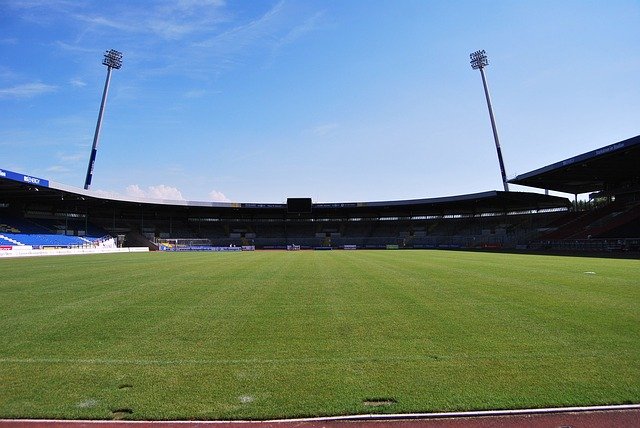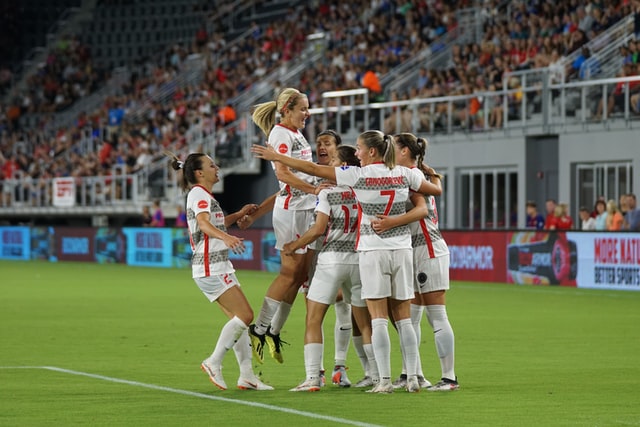Soccer is the most popular sport around the world without a doubt. Literally billions of people watched the last soccer world cup that took place in Russia in 2018.
However up until this date, soccer isn’t the most popular sport in the United States. Many people claim that one of the reasons behind the less popularity of soccer in the United states is that there aren’t a lot of goals scored in a soccer match.
Which is true. during a soccer match, the number of scored goals is usually low. But why is that? Here’s a list of some possible reasons why there isn’t more goal scoring in soccer than in other sports.
1- Soccer fields are very large
One of the main reasons why you don’t see a lot of goals during a soccer match is because the soccer fields are large.
Since the soccer field is large, the players of each team are forced to spread themselves across the whole field and assign roles to each other.

Most of these roles involve defending their team’s own goal instead of attempting to score a goal. For example, only the forward players are expected to score goals.
It’s true that midfielders and defenders score goals too, however, their primary focus during the game is to control the ball and attempt to pass it to the forwards so that they can score a goal.
So in other words, playing on a large field limits the number of players that actually attempt to kick the ball towards the opponent’s net because the others will have to be spread on the field to defend their own net.
You might think that defenders can attack when their team has the ball, but that’s not always practical in soccer. In soccer, the field is so large that it makes it quite impossible for a defender to survive for a full game if they keep running back and forth between the 2 nets on the field.
So a larger field means that less players are attempting to actually score goals.
2- Soccer players can’t use their hands to grab the ball
Out of all the soccer rules, the one that is mostly known among the soccer fans is that soccer players are not allowed to touch the ball with their hands.
But how does this mean less goals per match? Well, controlling the ball with your legs is much harder than grabbing the ball with your hands and running towards your opponent’s goal.
You’ll need years of practice to be able to perfectly control the soccer ball with your legs.
This means that stealing the ball from the opponent is easier too. In soccer, a player can’t just attempt to run towards their opponent’s goal and dribble across all 11 opponent players then score a goal. Unless you’re Lionel Messi, you’ll most probably lose the ball immediately.
For this reason, soccer players are forced to coordinate with each other and pass the ball to each other until they reach the opponent’s goal. This type of coordination usually makes an attack attempt much longer which means less direct goal attempts per match.
3- Soccer nets are small
As you can clearly tell, the smaller the net is, the less likely players are going to score.
Soccer nets are relatively small compared to the size of the soccer field. On top of that, soccer goalkeepers are getting better and better every decade.
This makes it harder for the players playing in the forward position to score goals against their opponent.
4- Soccer teams only get one point per goal
In soccer, no matter how you score a goal, you’ll only get one point. If you score a goal from a very close distance, you get one point. If you score a goal with a header, you get one point. If you score a goal from a very large distance, you still only get one point and so on.
In other words, soccer does not give a higher priority for goals that are very difficult to score.

You might ask, what does this have to do with scoring more goals? Hear me out.
Under the current soccer rules, if a soccer team concedes 2 goals, they usually lose all the motivation to try and attempt to make a comeback since scoring 3 goals in a short period of time is very difficult in soccer.
This makes the rest of the match less competitive and some teams won’t even bother to try and win the match. Instead, what they do is try not to concede more goals till the rest of the match ends.
If, however, a header goal gives extra points for the team who scored it, then even if a soccer team is falling behind, they know that a comeback is more possible if they attempt to score a goal that rewards more points.
To explain it simpler, giving the losing team a better chance to comeback pushes them to keep attempting to score more goals during the match. It also pushes the winning team to attempt to score more even if they are already winning, because now they know that a comeback is always possible.
5- Soccer’s defense mentality
Throughout the years, the defense of the soccer teams kept getting better and better. During our time, penetrating a soccer team’s defense isn’t an easy task at all.
Usually, the focus for a soccer team is not just to score a goal, but to prevent the opponent from scoring at any cost.
The “Park the Bus” soccer strategy is a great example here. There are soccer teams that only attempt to defend their net during the whole game without even trying to score a goal.
These teams will place all of their 10 players and the goalkeeper close to their net and prevent any opponent’s attempt from scoring a goal.
This kind of defense mechanism makes it extremely difficult to score a high number of goals during a soccer match.
The reason that some soccer teams use very defensive strategies is that a tie in soccer is possible, and each team gets rewarded an equal amount of points if the game ends in a draw.
In other words, the defensive mentality that many soccer teams adopt is one of the reasons why you don’t see a lot of goals during a soccer match.
Does less goals in a soccer game make soccer boring?
Not at all. This is a complete misconception about soccer. More goals does not mean more entertainment. What soccer fans enjoy to watch is the build up to the goals and not just the goals itself.
Having less goals per a soccer game means that every goal is extremely celebrated and is extremely valuable to the team that scored it.
The level of excitement that a soccer fan gets when their team scores a goal is worth all the waiting.

Also one thing to note is that soccer fans enjoy a great performance too. For example, a brilliant save from a goalkeeper can get the audience more excited than if the goal was scored.
One last thing to mention here is that many soccer fans love the way the players celebrate after they score a goal. Some of these celebrations, Like Cristiano Ronaldo’s celebrations, have become iconic in the soccer world. Each soccer player has their unique way of celebrating a goal that they score.
These kinds of celebrations won’t be as appealing if they take place every 10 minutes in the match. However, since usually a soccer match doesn’t have a lot of goals scored in it, each goal counts, and each celebration counts.
If you’re debating whether to start watching soccer or not, here’s a guide that will help you enjoy watching your first soccer match if you ever decide to get started.
Thank you for reading this far. Enjoy the rest of your day.

